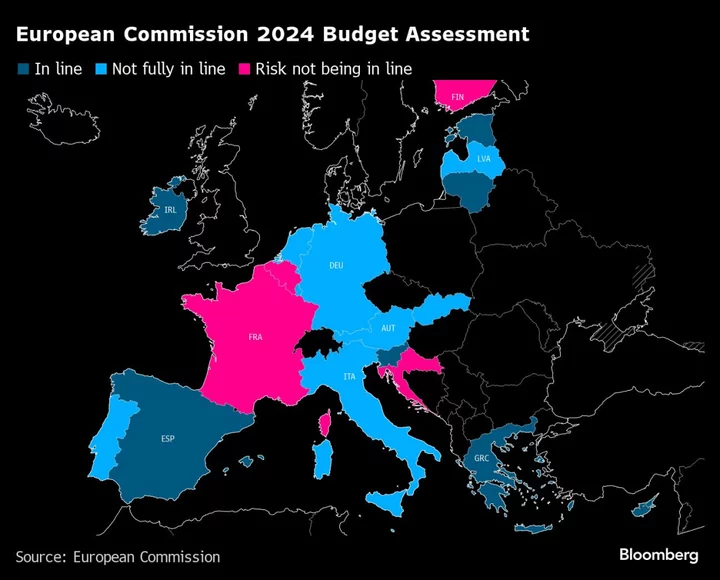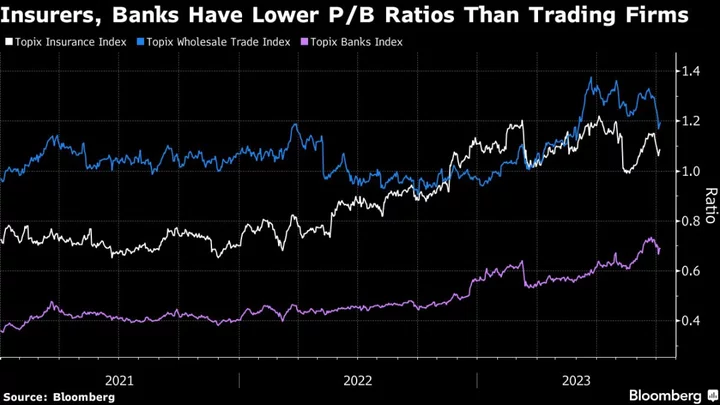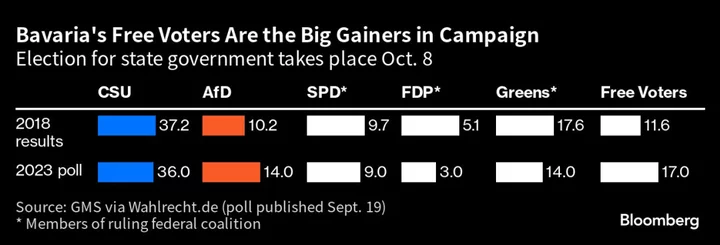France is at risk of flouting European Union fiscal guidance while Germany and Italy aren’t seen to be fully complying, according to a critique by Brussels officials of the bloc’s top three economies.
The watch list of countries — released on Tuesday — forms part of the European Commission’s opinion on national budgets for 2024, a year when the bloc is set to reinstate debt and deficit rules suspended during the pandemic.
The assessment reveals how brazen some of Europe’s most indebted countries are judged to be by Brussels officials at a time of rising borrowing costs and heightened scrutiny on public finances. Being on the list doesn’t have automatic repercussions, though it could prompt sanctions at a later stage.
The commission told the French government to take the necessary steps to meet the EU’s fiscal recommendations for next year, which includes controlling net expenditure growth and phasing out energy support measures.
France’s place on the scorecard highlights how Emmanuel Macron’s government is struggling to balance the country’s fiscal profile with voter demands for more spending. Debt as a percentage of output is expected by the commission to rise to 110% of gross domestic product by 2025, according to forecasts released last week.
The French finance ministry said it doesn’t expect to have to take new measures after Tuesday’s opinion. That’s because there’s only a minor difference between the government’s spending plans and the European Commission’s recommendation, and as the economic growth outlook has improved, a French official said briefing the press on condition of anonymity.
Belgium, Finland and Croatia are in the same category as France, while Austria, Latvia, Luxembourg, the Netherlands, Portugal and Slovakia are in the same group as Italy. The latter country is nursing a debt ratio of around 140% of GDP.
In the case of Germany, the commission said energy support should be wound down as soon as possible instead of carrying on through 2024. The verdict on Europe’s biggest economy doesn’t factor in last week’s constitutional court decision, which forbade the use of off-balance sheet funding to target climate change. That ruling led the Finance Ministry to impose an emergency spending freeze.
While the commission didn’t find Spain’s budget at risk of breaching fiscal recommendations and Italy also avoided that classification, Brussels still considers the underlying situation of these two economies challenging, a senior commission official said.
The Italian government will be in a more difficult position next year as its net expenditure is expected to be higher than initially anticipated by 0.6% of GDP. In addition, the EU executive’s arm found that Rome should have used the savings from phasing out the energy-related measures to consolidate public finances, but instead Giorgia Meloni’s government further inflated spending.
The EU’s assessment follows a pandemic-induced suspension of the fiscal regime limiting deficits to 3% of GDP, a ceiling that both France and Italy are expected to keep flouting in the coming two years.
The hiatus during Covid also gave the bloc a chance to reflect on a potential revamp of the entire budget rulebook that binds the euro zone’s eclectic economies — known as the Stability and Growth Pact.
There’s general agreement that the SGP framework is in need of a root-and-branch overhaul, but governments with competing strategic visions are struggling to agree on how to go about it. If no decision is reached by the end of the year, the old rules kick back in as before.
The EU watch list will ultimately form the basis for the commission to decide whether to trigger the so-called excessive deficit procedure if a country fails to take sufficient efforts to correct the risk of non-compliance, which could eventually lead to financial penalties.
Currently there are nine countries whose deficits violate the 3% of GDP threshold, including Italy, France, Spain and Belgium. Once the data are confirmed in 2024, the commission intends to launch excessive deficit procedures in spring, a senior commission official said — that would force those countries to present severe adjustments paths.
The history of sanctions is patchy. Spain and Portugal were first to officially breach the pact, but the bloc decided then not to impose penalties.
France and Germany have breached the rules repeatedly — and Jean-Claude Juncker, then-EU Commission President, said in 2016 that Paris was getting extra time to reduce its deficit “because it is France.”
--With assistance from William Horobin and Ania Nussbaum.
(Updates with French government comment in sixth paragraph)









